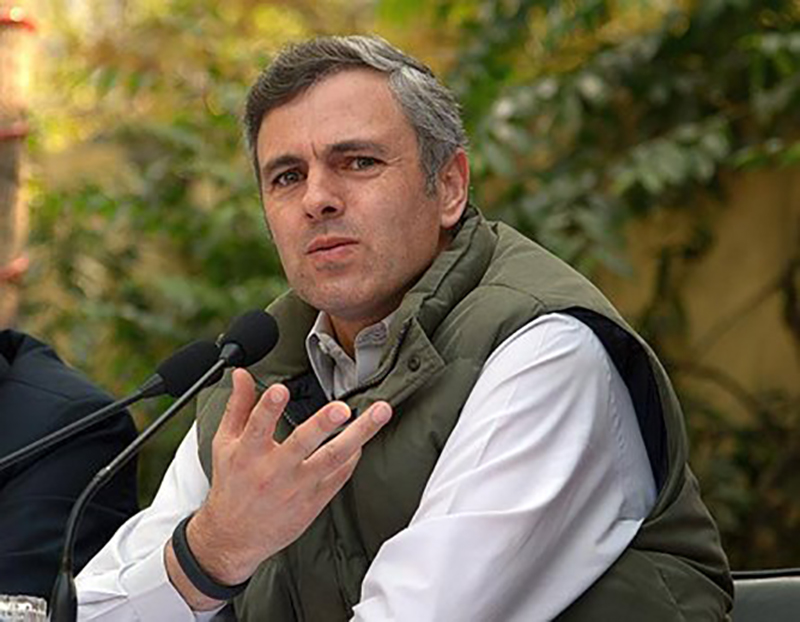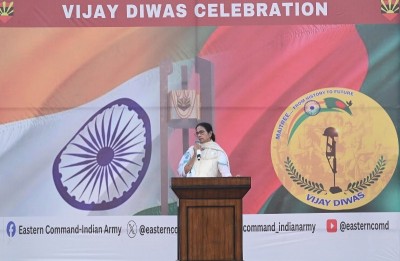
Jammu Kashmir polls: Omar Abdullah says what would be Assembly's top priority once elected
Srinagar: Former Jammu and Kashmir Chief Minister and National Conference leader Omar Abdullah announced that the priority of the Jammu and Kashmir assembly after the election would be to pass a resolution opposing the central government's decision to revoke the region's statehood and special status.
Once elected, the assembly would focus on the difficult task of restoring the statehood and rights that were taken from the people.
"The first order of business of the elected assembly of J&K should be to make it known not just to the rest of India but to the world at large that the people of J&K don't agree with what happened to us on 5th August 2019, and then we start undoing what was done to us," Abdullah told NDTV in an exclusive interview.
Assembly elections in Jammu and Kashmir, the first since the region lost its statehood and special status under Article 370 in 2019, will be held in three phases on September 18, 25, and October 1. The vote counting is scheduled for October 4.
"I believe that one of the main jobs of the elected chief minister will be to ensure that full statehood is restored to J&K at the earliest because only as a state we can start to undo the damage that has been done to J&K after 2019," he said.
The announcement of elections for the 90-member assembly comes months after the Supreme Court upheld the central government's decision to revoke Jammu and Kashmir's special status.
The court also ordered that assembly elections be conducted by September 30. The previous assembly elections in the region were last held in November-December 2014.
A vocal critic of the government's move to abrogate Article 370, the 54-year-old Omar Abdullah stated that the National Conference would approach the Supreme Court again if the central government fails to immediately restore Jammu and Kashmir's statehood.
"It's going to be a fight to restore the statehood. Nothing is going to come to us easily. Even these elections didn't come to us easily," he said.
In December 2023, a five-judge bench of the Supreme Court unanimously supported the central government's decision to revoke Article 370, labeling it a "temporary provision" intended to facilitate the former state's 1947 merger with India.
The Supreme Court also directed the central government to expedite the restoration of Jammu and Kashmir's statehood at the earliest opportunity.
Abdullah also launched a blistering attack on "unqualified and unquestioned" Jammu and Kashmir Lt Governor Manoj Sinha.
"The elected government will push back the dictatorial rule of Lt Governor," he told NDTV.
Jammu and Kashmir has been under the President's Rule since December 19, 2018. Initially implemented for six months, it followed a political crisis in June of that year when the BJP withdrew its support from the then-ruling Peoples Democratic Party (PDP) government, led by former Chief Minister Mehbooba Mufti.
President’s rule has been extended several times after the end of the initial period.
"Today, the LG is the unqualified and unquestioned ruler of J&K. Even with the powers the LG has, he will not be able to exercise them as freely once you have an elected government and a strong Chief Minister," said the former chief minister of Jammu and Kashmir.
Omar Abdullah also indicated he might revisit his decision to not contest polls until Jammu and Kashmir's statehood is reinstated.
The decision to reconsider his decision follows “messages, emails, phone calls” in this regard from several people, he said, adding that the final call will be taken by the National Conference led by his father Farooq Abdullah.
"I would be lying if I said there is no pressure on me," he added.
Referring to the upcoming elections as "the most significant" in the past three generations, Abdullah remarked that they are being held at a time when Ladakh is no longer part of the region, and after Jammu and Kashmir was divided into two union territories.
He pointed out that the elections are also taking place after the revocation of Jammu Kashmir’s special status and the delimitation process.
He maintained that the outcome of these elections would have far-reaching consequences.
Abdullah emphasised that the elections would be an opportunity for the people to register their unhappiness over what happened on August 5, 2019.
He did not rule out an alliance with the Congress in the elections but seat-sharing has its own challenges, underscoring that working out such an arrangement would not be smooth.
"We had one preliminary round of discussions with the Congress, it didn't reach very far. After that, we didn't hear from them again. It's not a closed chapter as far as we are concerned," the former Jammu Kashmir chief minister was quoted as saying by NDTV.
"Seat sharing brings with it its own challenges, I have 90 candidates. There is a problem of plenty," he said.
In the recent Lok Sabha elections in Jammu and Kashmir, the Congress-National Conference (NC) alliance secured 41.7 percent of the votes, while the former allies, the BJP and PDP, received 17 percent and 8 percent, respectively.
Support Our Journalism
We cannot do without you.. your contribution supports unbiased journalism
IBNS is not driven by any ism- not wokeism, not racism, not skewed secularism, not hyper right-wing or left liberal ideals, nor by any hardline religious beliefs or hyper nationalism. We want to serve you good old objective news, as they are. We do not judge or preach. We let people decide for themselves. We only try to present factual and well-sourced news.







